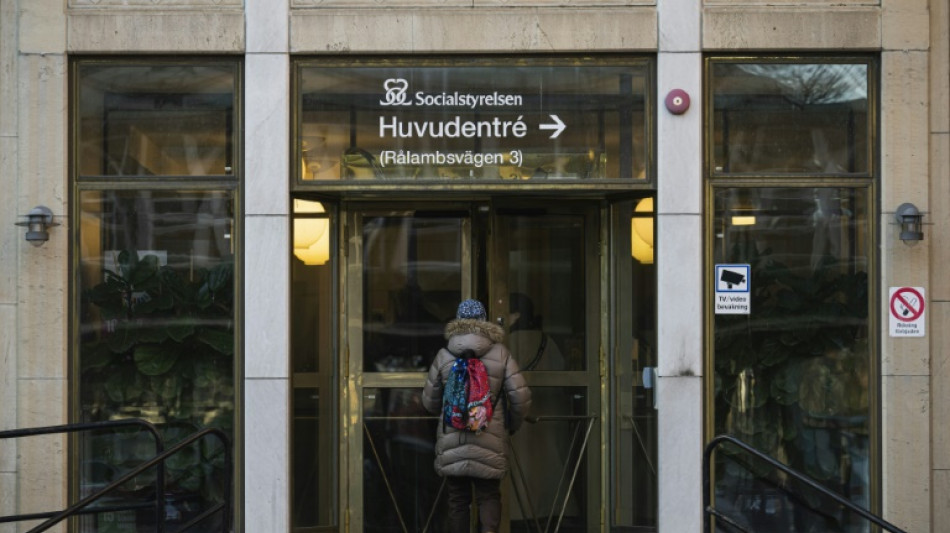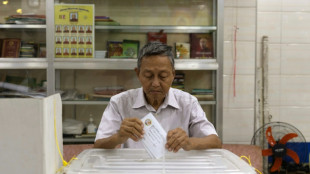
-
 Giannis triumphant in NBA return as Spurs win streak ends
Giannis triumphant in NBA return as Spurs win streak ends
-
How company bets on bitcoin can backfire

-
 Touadera on path to third presidential term as Central African Republic votes
Touadera on path to third presidential term as Central African Republic votes
-
'Acoustic hazard': Noise complaints spark Vietnam pickleball wars

-
 Iraqis cover soil with clay to curb sandstorms
Iraqis cover soil with clay to curb sandstorms
-
Australia's Head backs struggling opening partner Weatherald

-
 'Make emitters responsible': Thailand's clean air activists
'Make emitters responsible': Thailand's clean air activists
-
Zelensky looks to close out Ukraine peace deal at Trump meet

-
 MCG curator in 'state of shock' after Ashes Test carnage
MCG curator in 'state of shock' after Ashes Test carnage
-
Texans edge Chargers to reach NFL playoffs

-
 Osimhen and Mane score as Nigeria win to qualify, Senegal draw
Osimhen and Mane score as Nigeria win to qualify, Senegal draw
-
Osimhen stars as Nigeria survive Tunisia rally to reach second round

-
 How Myanmar's junta-run vote works, and why it might not
How Myanmar's junta-run vote works, and why it might not
-
Watkins wants to sicken Arsenal-supporting family

-
 Arsenal hold off surging Man City, Villa as Wirtz ends drought
Arsenal hold off surging Man City, Villa as Wirtz ends drought
-
Late penalty miss denies Uganda AFCON win against Tanzania

-
 Watkins stretches Villa's winning streak at Chelsea
Watkins stretches Villa's winning streak at Chelsea
-
Zelensky stops in Canada en route to US as Russia pummels Ukraine

-
 Arteta salutes injury-hit Arsenal's survival spirit
Arteta salutes injury-hit Arsenal's survival spirit
-
Wirtz scores first Liverpool goal as Anfield remembers Jota

-
 Mane rescues AFCON draw for Senegal against DR Congo
Mane rescues AFCON draw for Senegal against DR Congo
-
Arsenal hold off surging Man City, Wirtz breaks Liverpool duck

-
 Arsenal ignore injury woes to retain top spot with win over Brighton
Arsenal ignore injury woes to retain top spot with win over Brighton
-
Sealed with a kiss: Guardiola revels in Cherki starring role

-
 UK launches paid military gap-year scheme amid recruitment struggles
UK launches paid military gap-year scheme amid recruitment struggles
-
Jota's children join tributes as Liverpool, Wolves pay respects

-
 'Tired' Inoue beats Picasso by unanimous decision to end gruelling year
'Tired' Inoue beats Picasso by unanimous decision to end gruelling year
-
Thailand and Cambodia declare truce after weeks of clashes

-
 Netanyahu to meet Trump in US on Monday
Netanyahu to meet Trump in US on Monday
-
US strikes targeted IS militants, Lakurawa jihadists, Nigeria says

-
 Cherki stars in Man City win at Forest
Cherki stars in Man City win at Forest
-
Schwarz records maiden super-G success, Odermatt fourth

-
 Russia pummels Kyiv ahead of Zelensky's US visit
Russia pummels Kyiv ahead of Zelensky's US visit
-
Smith laments lack of runs after first Ashes home Test loss for 15 years

-
 Russian barrage on Kyiv kills one, leaves hundreds of thousands without power
Russian barrage on Kyiv kills one, leaves hundreds of thousands without power
-
Stokes, Smith agree two-day Tests not a good look after MCG carnage

-
 Stokes hails under-fire England's courage in 'really special' Test win
Stokes hails under-fire England's courage in 'really special' Test win
-
What they said as England win 4th Ashes Test - reaction

-
 Hong Kongers bid farewell to 'king of umbrellas'
Hong Kongers bid farewell to 'king of umbrellas'
-
England snap 15-year losing streak to win chaotic 4th Ashes Test

-
 Thailand and Cambodia agree to 'immediate' ceasefire
Thailand and Cambodia agree to 'immediate' ceasefire
-
Closing 10-0 run lifts Bulls over 76ers while Pistons fall

-
 England 77-2 at tea, need 98 more to win chaotic 4th Ashes Test
England 77-2 at tea, need 98 more to win chaotic 4th Ashes Test
-
Somalia, African nations denounce Israeli recognition of Somaliland

-
 England need 175 to win chaotic 4th Ashes Test
England need 175 to win chaotic 4th Ashes Test
-
Cricket Australia boss says short Tests 'bad for business' after MCG carnage

-
 Russia lashes out at Zelensky ahead of new Trump talks on Ukraine plan
Russia lashes out at Zelensky ahead of new Trump talks on Ukraine plan
-
Six Australia wickets fall as England fight back in 4th Ashes Test

-
 New to The Street Show #710 Airs Tonight at 6:30 PM EST on Bloomberg Television
New to The Street Show #710 Airs Tonight at 6:30 PM EST on Bloomberg Television
-
Dental Implant Financing and Insurance Options in Georgetown, TX


Sweden puts brakes on treatments for trans minors
Sweden, the first country to introduce legal gender reassignment, has begun restricting gender reassignment hormone treatments for minors, as it, like many Western countries, grapples with the highly-sensitive issue.
With the number of diagnoses soaring, the medical community faces the dilemma of weighing precaution against the risks associated with not offering treatment to those suffering from "gender dysphoria".
Sweden decided in February 2022 to halt hormone therapy for minors except in very rare cases, and in December, the National Board of Health and Welfare said mastectomies for teenage girls wanting to transition should be limited to a research setting.
"The uncertain state of knowledge calls for caution," Board department head Thomas Linden said in a statement in December.
So-called puberty blockers have been used in young teens contemplating gender transition to delay the onset of unwanted physical changes.
Like many other countries, Sweden has seen a sharp rise in cases of gender dysphoria, a condition where a person may experience distress as a result of a mismatch between their biological sex and the gender they identify as.
According to the Board of Health and Welfare, approximately 8,900 people were diagnosed with gender dysphoria in Sweden between 1998 and 2021, in a country of around 10 million.
In 2021 alone, about 820 new cases were registered.
The trend is particularly visible among 13- to 17-year-olds born female, with an increase of 1,500 percent since 2008.
"It used to be a male phenomenon and now there is a strong female over-representation," psychiatrist Mikael Landen, chief physician at Sahlgrenska University Hospital in Gothenburg, told AFP.
Landen, who contributed to the scientific study on which the Board of Health based its decision, said the reasons for this increase remain largely a "mystery".
"Tolerance has been high in Sweden for at least the last 25 years, so you can't say it has changed," he said when asked if it was simply a result of a more accepting society.
- Western debate -
The profile of those diagnosed is often complex, according to Linden, as gender dysphoria often occurs in those also suffering from other diagnoses, such as attention deficit and eating disorders or autism.
In May 2021 -- before the Swedish authorities' decision to restrict gender reassignment hormone treatments -- the prestigious Karolinska Hospital in Stockholm chose to restrict such hormone treatments to research projects only.
Other countries are weighing the same questions.
Neighbouring Finland took a similar decision in 2020, while France has called for "the utmost reserve" on hormone treatments for young people.
The UK meanwhile saw a high-profile court case in 2020.
Keira Bell, who regretted her transition from female to male, filed a complaint against the public body responsible for gender dysphoria treatments, claiming she had been too young at age 16 to consent to the treatments.
She ultimately lost her case.
Sweden's recent rollback is all the more notable as it was first in the world to authorise legal gender transition in 1972, paving the way for sex reassignment surgery to be covered by its universal healthcare system.
Rights groups have expressed concern.
Elias Fjellander, president of the youth branch of RFSL, the country's main organisation championing LGBTQ rights, says Sweden's decision risks leading to increased suffering.
"These people might need more care and invasive procedures in the future, because the decision could not be made earlier, even though the medical need was there," he said.
Twenty-year-old Antonia Lindholm, a trans woman who began her transition as a teenager, agreed.
"I think hormones save a lot of people," she told AFP.
"If I were 13 today, I wouldn't have a chance" of getting this treatment, Lindholm added.
- Regret -
But others who have had hormone treatment support the Swedish position.
Mikael Kruse, 36, changed his gender in his late 20s but had a change of heart and finally "detransitioned".
"I think it's good to take a break to understand what's going on," he told AFP.
For seven years, the Swede lived as a woman, but that never resolved his discomfort.
A new diagnosis revealed he had Asperger's Syndrome as well as Attention Deficit Disorder, and the suffering he thought was related to his gender was due to different factors.
"All the pieces of the puzzle fell into place," Kruse said.
For Carolina Jemsby, co-director of the Swedish documentary The Trans Train which brought the care of adolescents into the limelight in 2019, the current debate shows it is "more complex than the healthcare system and society had hoped".
"One aspect of this dilemma is that it has become a political issue," she told AFP.
"It does a disservice to this group who need scientifically proven medical care to help them and give them a better life, and a better ability to live who they are."
In 1972 Sweden introduced an act to allow people to legally change their gender thus becoming, according to the government, "the first country in the world to introduce a formal option in law to be assigned with a new legal gender".
P.Silva--AMWN



